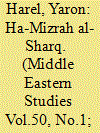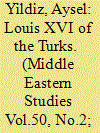|
|
|
Sort Order |
|
|
|
Items / Page
|
|
|
|
|
|
|
| Srl | Item |
| 1 |
ID:
128414


|
|
|
|
|
| Publication |
2014.
|
| Summary/Abstract |
January 22nd, the date usually celebrated in Ukraine as the Day of Unity between east and west, will now go down in history as the day the two-months-long Euromaidan movement saw its first fatalities as violence escalated in Kyiv's city center, with internal troops and special forces pitted against the formerly peaceful protesters in a vicious, at times almost medieval battle. One civic activist was found beaten to death in the woods outside Kyiv, and others were shot as they took part in the standoff.
|
|
|
|
|
|
|
|
|
|
|
|
|
|
|
|
| 2 |
ID:
128215


|
|
|
|
|
| Publication |
2014.
|
| Summary/Abstract |
During the span of 22 months stretching from the entry of Fayal b. Husayn into Damascus in October 1918 until his expulsion at the end of July 1920, 42 newspapers and 13 journals appeared in Syria, more than half of them in Damascus. During this time, in which the press had a critical role in expressing and shaping public opinion in Syria, it became clear to the emissaries of the Zionist institutions in Damascus that they, too, needed to turn to this medium in order to spread their message. Hence, they argued that there was a need to publish a newspaper reflecting a moderate and calming outlook that would draw Arabs and Jews nearer to and increase their understanding of the Zionist idea. The result of their activities in this area saw the founding of a bilingual, Hebrew and Arabic, newspaper, called ha-Mizrah/al-Sharq ('The East'). An examination of the only extant copies of the three issues that were printed before the newspaper ceased publication provides us with a deeper observation into the Zionist activities in Damascus during the reign of King Fayal.
|
|
|
|
|
|
|
|
|
|
|
|
|
|
|
|
| 3 |
ID:
130572


|
|
|
|
|
| Publication |
2014.
|
| Summary/Abstract |
Leftist movements of the mid-twentieth century have a well earned reputation for sexual conservatism. However, these movements were not of a simplistic reactionary type, but rather were embedded in sexualized contexts that functioned through the displacement of individual sexual desire. Following from the work of Ka F. Wong and his Lacanian analysis of the way displaced sexuality functioned in the experience of participants in the Chinese Cultural Revolution, this paper applies Lacan's concepts of repressed libidinal energy to analyse the sexual politics of the Communist Party of Thailand (CPT) from the 1970s to the early 1980s. The CPT promoted personal sexual discipline as a moral alternative to the purported sexual licentiousness and moral bankruptcy of their right-wing opponents. The paper, moreover, argues that party discipline, particularly regarding gender and sexuality, was not necessarily experienced as an annoyance or deprivation, but rather was recounted by participants as liberating, necessary, and even spiritual.
|
|
|
|
|
|
|
|
|
|
|
|
|
|
|
|
| 4 |
ID:
128222


|
|
|
|
|
| Publication |
2014.
|
| Summary/Abstract |
Selim III ruled the Ottoman Empire in the Age of Revolutions, but his rule did not reflect the vigorous, expansionist and aggressive spirit of this age. He more resembled a ruler forced to defend his empire from the turbulence of the age, an effort which also shaped his character and perception of rulership. During his years in royal confinement, he clung passionately to the revival of the warrior-sultan through charismatic leadership. While on the throne, there was a gradual transformation of his perception of rulership and he became satisfied with being the bureaucratic ruler of the empire.
|
|
|
|
|
|
|
|
|
|
|
|
|
|
|
|
|
|
|
|
|